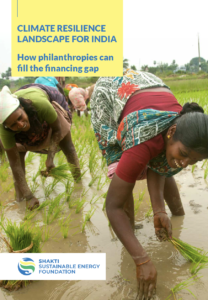According to the Global Climate Risk Index 2021, India ranked 7th out of 180 countries affected by climate change. More than 75% of Indian districts are hotspots for extreme climate events. Across the country, climate change has begun to exacerbate societal challenges in education, health, human rights, equality, and food security.
Mitigating climate impacts and building resilience among communities is vital for India to sustain its developmental trajectory while simultaneously tackling climate change. Indeed, India’s ambitious new climate pledges at COP 26 will require significant effort at the central and sub-national levels and by stakeholders across the board.
Philanthropic action has played a key role in advancing climate action in India. Yet, here and globally, philanthropic resources remain insufficient when compared with the magnitude of the problem. The window to stabilise the climate is brief so results matter greatly for the future of humanity. More and better funding can protect vulnerable stakeholders and communities and speed the net zero transition.
 Climate Resilience Landscape — How Philanthropies can Fill the Financing Gap provides an overview of climate change issues in India mapping initiatives by key stakeholders including the central government, state governments, civil society, bilateral and multilateral agencies, private sector and philanthropic initiatives. It identifies the key gaps in advancing climate resilience interventions and offers solutions to holistically address these issues. Based on this analysis, it highlights the following strategic priorities where the philanthropic community can intervene to advance climate action in India:
Climate Resilience Landscape — How Philanthropies can Fill the Financing Gap provides an overview of climate change issues in India mapping initiatives by key stakeholders including the central government, state governments, civil society, bilateral and multilateral agencies, private sector and philanthropic initiatives. It identifies the key gaps in advancing climate resilience interventions and offers solutions to holistically address these issues. Based on this analysis, it highlights the following strategic priorities where the philanthropic community can intervene to advance climate action in India:
Evidence-based Planning and Implementation
- Provide state governments with the knowledge support that they may require to develop effective roadmaps for low-carbon and climate-resilient development
- Make sure the roadmaps are absorbed within the State Transition Plans or State Action Plans on Climate Change (SAPCCs) or state budgets, with the intention of ensuring definitive state buy-in
Capacity Building of Government
- Enhance the capacities of government officials to implement the measures outlined in the roadmaps through technical assistance
- House experts within the government by setting up a project management unit (PMU) to promote seamless flow of information between CSOs, the research community, and policy makers. Aim to have the PMU absorbed by the state government in due time
- Support project implementation in selected cases and help states develop detailed project reports, investment plans, green procurement guidelines and design incentive structures and tender templates.
- Undertake these implementation activities together with concerned state officials, providing them with hands-on training in the aforementioned activities
Enhancing Local Institutional Capacities for Climate Action
- Incubate and/or augment capacity within the existing local CSO ecosystem by training existing resources on climate change issues, engaging new actors through institutional grants, and providing other hand-holding support as required
- Simultaneously, facilitate the formation of partnerships between the local CSOs and established organisations to give exposure to the local CSOs to active projects and build their capacities
Cementing Government Ownership
- Work with the state government to either strengthen existing climate committees or constitute new ones. These committees should be headed by high-level authorities within the state government and include actors from various sectors or line departments to foster government ownership
Cross-Learning at the Sub-National Level
- Work with partners across India to ensure cross-state diffusion of the learnings and findings from “model” states
- Support learning exchange via conventions, coalitions, knowledge products, training modules, cross-learning platforms, and networks and other available channels
- Facilitate robust centre-state dialogues to ensure the necessary provisions are in place for state level climate action
